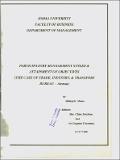| dc.description.abstract | Generally the objective of this research paper is to introduce participatory
management styles in to the Trade, Industry, & Transport Bureau (TIT) of the South
Nations, Nationalities & Peoples' state at Awassa. Specifically, this objective can be
improving job satisfaction in order to reduce employee turn-over & absenteeism;
empowering employees so as to make them capable of working with the minimum
possible help form their respective supervisors; instilling the idea of 'esprit de corp' in
order that employees & mangers may develop the culture of working together in solving
problems & looking for opportunities; fostering transparency & accountability between
the management & subordinates by adopting sound communication in the organization.
To get the appropriate data form the target population, questionnaires &
interviews had been used. As this study is geared towards a single organization, ca~
study on Trade, Industry, & Transport Bureau (TIT), all of the population having a total
number of 70, have been communicated either through questionnaires or interviews.
Hence, the approach used in this case study is, a census approach which is more accurate
& reliable than the sampling technique.
The result part of the study showed that about 34% of the existing management
style is semi autocratic, nearly 56% of the employees do not participate in planning &
developing goals due to the dominance of the management in planning & developing
goals, 46% do not have good attitude (affection) to their department due to lack of
motivation & routine activities, 49% have not ever tried better ways of doing their job
owing to lack of self preparedness, 48% showed management-subordinate relationship
which is not good & hence needs further improvement, 79% support the participatory
aspects of management, & 44% indicated that conflicts stem from job overlapping. | en |


